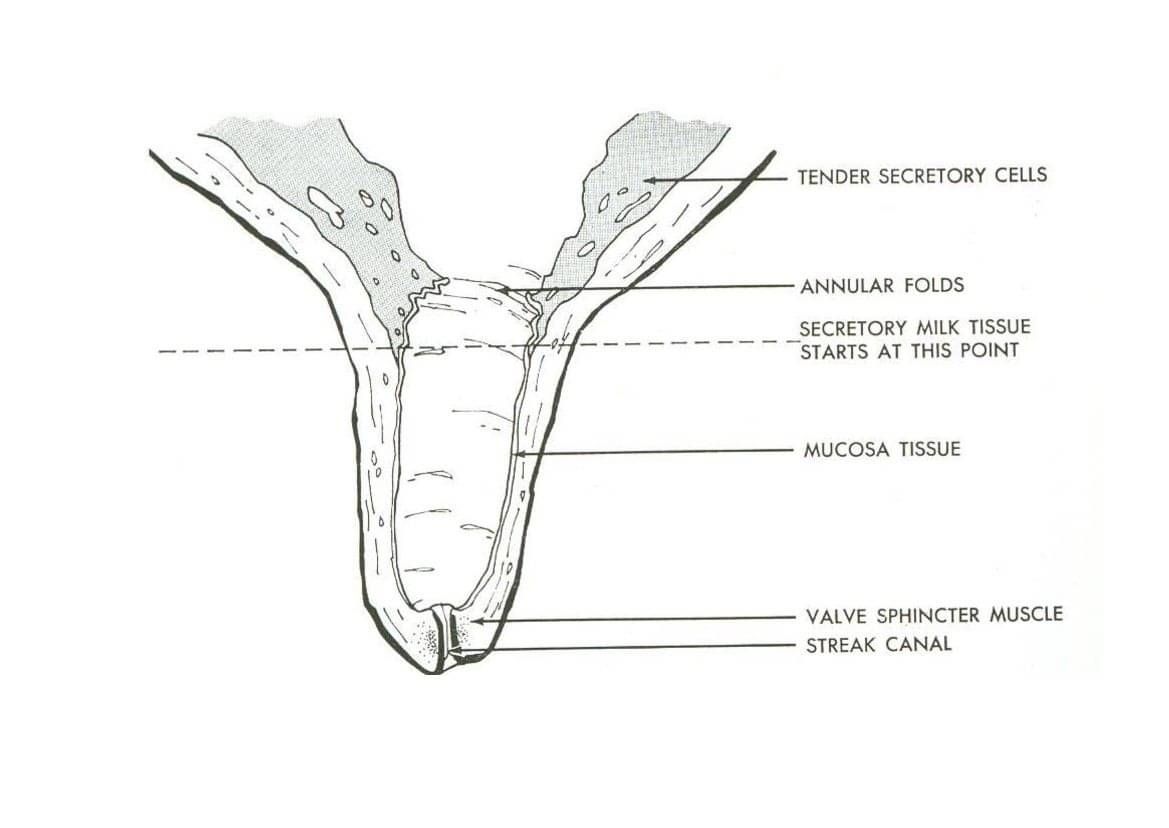Mastitis is a Man Made Problem by Peter Lester
we insist that he leave and never return!
For any unwanted guest to enter a potentially stable abode, in this case the udder, some one must have opened the door! That door in the udder is normally locked securely by a muscle found in every orifice in the body; that muscle is termed the "SPHINCTER MUSCLE" and is designed to let products out, and stop foreign products entering or invading. It is a one-way door lock, a one-way hinge.

We have now established that it is a muscle that normally holds the door closed, now it's open, so what compromised this muscle? What caused it to fail? The atom 'calcium' controls the contraction phase of each muscle, the relaxation phase being controlled by potassium. Your heart beats the same way. If we were to increase the calcium to excess, the heart would stop in the fully contracted phase, this is termed 'calcium rigor'; if on the other hand we were to increase large amounts of potassium into the portal blood, the heart will cease to function and stop in the fully relaxed phase, and is termed 'potassium inhibition'. Therefore, the rate and ratios of these two elements in the diet have a major influence on the contraction and relaxation of all muscles.
Now, we are concerned with the sphincter muscle, remember this is the wee muscle that controls the door to each orifice, in this case the udder. If the animal was to receive too much potassium, and she is, the door or sphincter muscle will fail to fully contract and the udder will be open to the invasion of bacteria and hey presto, we have a condition of inflammation of the mammary glands termed mastitis.
This portion was added by Dr Bob Scott of Minnesota.
The animal is subject to infection all because we placed her under stress. Stresses and strains have one thing in common, they all take money out of your pocket and put it in someone else's, in this case the drug companies.
The drug company has a ready remedy to sell called an antibiotic so now we add another foreign protein to the mix.
If you have a drug like penicillin or some other foreign protein and it is in the milk it winds up in the milk you sell, the buyer or the processor discovers this contaminant instead of getting a payment for the milk you thought you sold you will get a bill for the tanker load you spoiled with the contaminating product.
When we think we can outsmart the perfect systems in the natural mechanics of crop and animal production we run the risk of adverse reactions. .
All things in nature have a spectacular balance. If we attempt to accelerate the growth of crops or grass in the field and add excessive non-protein nitrogen of any source we can certainly make the crop grow differently. The cells are longer, the grass is greener and the nutritional quality is lessened. Our meddling has changed the perfect balance and the more we meddle the bigger the change we cause in the plant and the animal that consumes it. When we change the structure in the plant we have set up an undesirable condition for the animal to deal with.
If the crop is wholesome because of the nutrients it contains, and we have corrected an imbalance we can rest assured the animal who eats the perfect balanced crop will reward us with a healthy and abundant production.
We can take this step a bit further. If we know what is in your crop and we discover that a simple addition of a special element like calcium, or even a trace mineral, is required we can advise you how to establish the proper balance. But the qualification is that we must know what we are doing. We don't know until we test. Testing will give us the answers.
The bottom line is always better when you know what you are doing. Unless you know what your soil contains you can easily make things much worse by adding an element that spoils a balance.
The ratios of electrolytes in the diet have far reaching implications ranging from mastitis, bloat, foot rot, pink eye, fly strike, heart failure, the list goes on and on. Now the system wants to apply urea along with an inhibiter. This inhibiter is specifically designed to curtail the activity of the bacteria so that the applied ammonia stays in the soil. This applied ammonia will attach itself to the surface of the soil particles and effectively sterilize it. By its very chemistry, it will displace all of the attached minerals, temporarily raising the soil pH and the plant will become saturated with ammonia. You think you have a mastitis problem now, just stand back.


